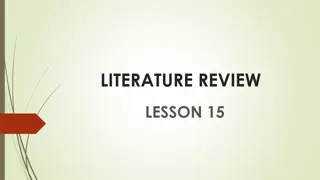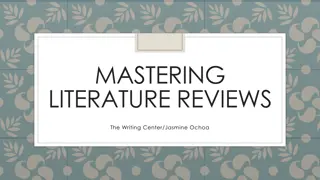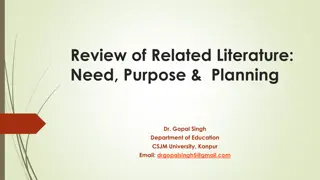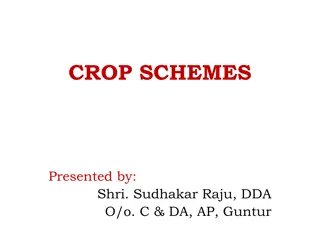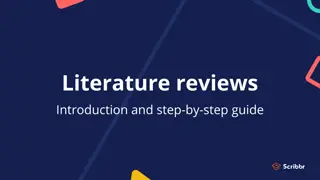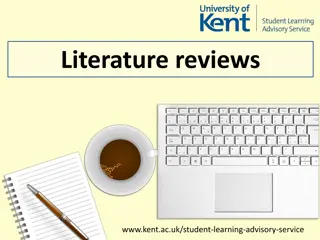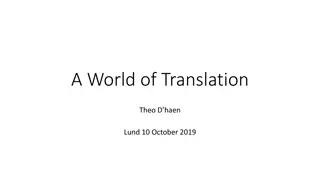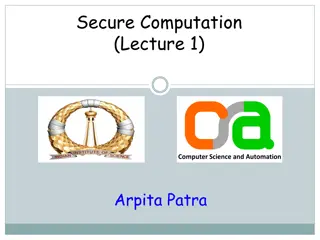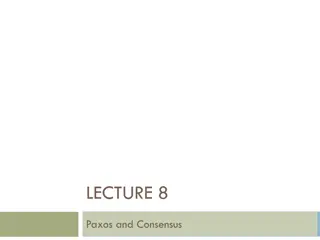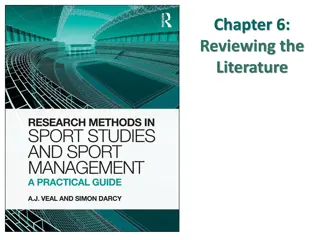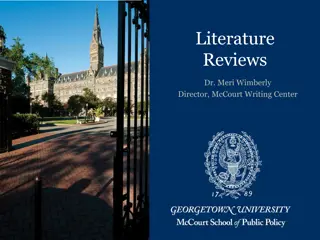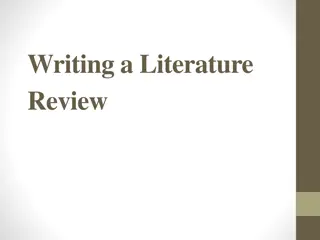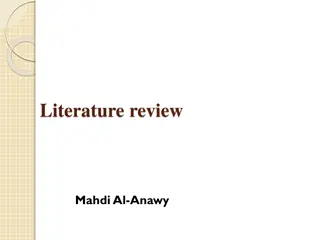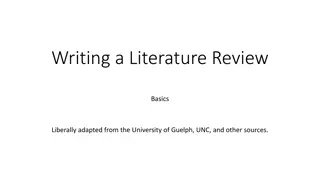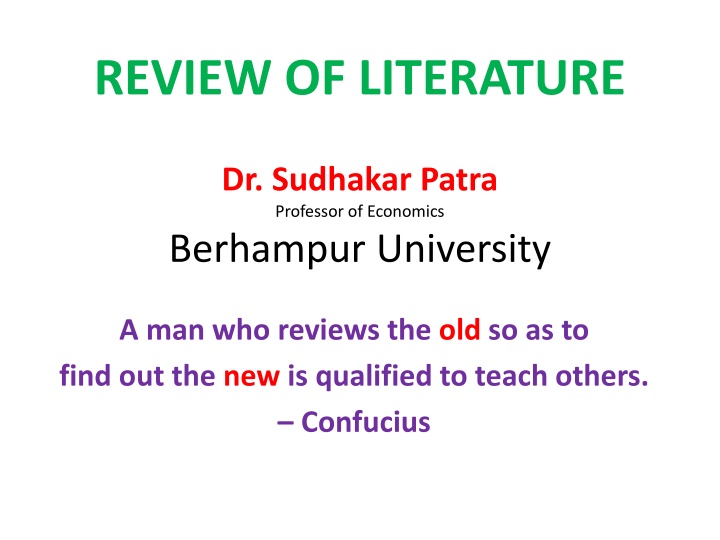
Characteristics of a Good Literature Review and Differences Explained
Explore the essence of reviewing literature with detailed insights on the process, types, and key characteristics of a good review. Understand the differences between academic papers and reviews, and learn how to distinguish between good and poor literature reviews effectively.
Download Presentation

Please find below an Image/Link to download the presentation.
The content on the website is provided AS IS for your information and personal use only. It may not be sold, licensed, or shared on other websites without obtaining consent from the author. If you encounter any issues during the download, it is possible that the publisher has removed the file from their server.
You are allowed to download the files provided on this website for personal or commercial use, subject to the condition that they are used lawfully. All files are the property of their respective owners.
The content on the website is provided AS IS for your information and personal use only. It may not be sold, licensed, or shared on other websites without obtaining consent from the author.
E N D
Presentation Transcript
REVIEW OF LITERATURE Dr. Sudhakar Patra Professor of Economics Berhampur University A man who reviews the old so as to find out the new is qualified to teach others. Confucius
Five- WWWWW What- To know existing subject Why To find research Gap When After identification of Research Problem--Before Synopsis Where In library Or internet Whom(For)- Your Research Direction
What is a review of literature? The review is a careful examination of a body of literature pointing towards the answer to one s research question. It is the effective evaluation of selected documents on a research topic. It spells out: 1.What is known about the subject? 2.What is the chronology of the development of knowledge about the subject? 3.Gaps in knowledge in the subject and how can it be bridged up through the current research 4.Consensus, debates and positions relating to the topic under treatment. 5.Directions to be taken.
CONTINUED: A review of literature discusses published information in a particular sometimes information within a certain time period. A review can be either a summary or a synthesis. Summary is a recap information of the source. Synthesis is a reorganisation or reshuffling of that information. subject area, of the important
Difference between an academic research paper and a review An academic research developing a new argument and contains a review. The review acts as the foundation and a support to the new insight generated through a research paper. The review unearths the existing academic exercises instead of new. paper aims at generating anything
Characteristics of a Good literature Review A good literature review has to be: 1. Comprehensive 2. Critical 3. Contextualised
Difference Between A Good and Poor Review A Good Review of Literature Is a synthesis of available research Is a critical evaluation Has appropriate breadth and length Has clarity and conciseness Confusing and longwinded Uses rigorous and consistent methods A Poor Review of Literature An annotated bibliography Confined to description Narrow and shallow Constructed in an arbitrary way
Purpose of a Review of Literature Why? Distinguishing what has been done from what needs to be done. Discovering important variables relevant to the topic. Synthesising and gaining a new perspective. Identifying relationships between ideas and practice. Establishing the topic or the problem.
Continued: Rationalising the significance of the problem. Enhancing and acquiring vocabulary. Understanding the structure of the subject Relating ideas and theory to applications. Identifying methodologies and techniques that have been used.( IMP) Placing the research in a historical context. the subject
Continued: Delimiting the research problem Seeking new lines of inquiry Avoiding fruitless approaches Gaining methodological insights Seeking support for grounded theories.
Types of Review of Literature There are six types of review of literature. They are : Argumentative Integrative Historical Methodological Systematic Theoretical
Continued: Argumentative: Examines literature selectively to support or refute an argument, deeply imbedded assumption or philosophical problem already established. This type of review is value laden in nature. Integrative: Synthesises representative literature on a topic in an integrated way such that new frameworks and perspectives on the topic are generated. The body of literature includes all that addresses related or identical hypotheses. It has clarity, rigour and replication.
CONTINUED Historical: Focus on examining research throughout a time period. Deals with issue, concept, theory, phenomena. Traces their evolution within the scholarship of a discipline. Methodological: Highlights on the method of analysis. It deals with conceptual to practical research.
Continued: Systematic : Consists of an overview of the existing evidence pertinent formulated research question. It identifies and critically appraises relevant establishes cause and effect relationship. Theoretical: To examine the corpus of theory that has accumulated with regard to an issue or phenomenon. This inadequacy of theories and enable for new frame work development. to clarify the research and often points to the
How to start Review of Literature 1. To prepare in advance a plan. 2. To preset the time limit. Steps To Be Followed: Leading Edge Research : a) Trying to research an area which has never been examined before. b) Look at journals that print abstracts in that subject area to get an overview of the scope of the available literature. C) Thus, locate the sources and then start searching. d) Author s reference constitutes the best source.
Continued----- Writing the review: a) One draft is always insufficient to produce an insightful and enriched review. b)Writing and rewriting is a must which will give a sense of forward momentum. c)Never restrict to write the review in linear fashion from start to finish. d) Forward and backward movement can ease the task.
Editing and rewriting a)Effective communication and efficient answering of the research question is the major target of the review. b)Editing makes the work clear, concise and consistent. c) Abstract, introduction and conclusion writing are to be deferred to the last. d) Carefully avoid the use of jargons, critical comments and very technical words. e) Revision and rewriting needs to take into consideration the comments of others the help of styles and writing guides.
Writing the conclusion a) Communication of ideas that emerged. b)Combination of your research question and observations. c) Conclusions derived. d) Grey areas yet needing further intellectual treatment . Mention about the quantum of research, quality of research, time of research. research, area of
HOW TO WRITE A STRONG LITERATURE REVIEW? Synthesize and evaluate information Identify the main ideas of the literature Trace out the main arguments in the literature Organise the chronology of development of the literature Write the literature review.
Synthesizing and evaluating information Literature review demands critical thinking, reading and writing. Gather literature , generate ideas, classify them, synthesize them. Locate the trends, significance, structure of the literature and strategies suggested . Added to this the key words used, jargons introduced, theoretical models followed. Focus on the conclusion drawn by the author and your estimation, perception.
Organise the chronology of development of the literature Supporting ideas Structure Significance Sources Strategies adopted Strategies suggested
Style of Writing Name(Title) Year Area- Country, State Sources of Data Objective/Question Methodology Model Result/finding
Quantification of Reviews 50 % review must be Recent (Last 10 years) 50 % review must be international( Outside the Country 50 % must be Quality Journals or Working Papers For M.Phil- 30-40 reviews For Ph.D 60 to 80 reviews For D. Lit- 100 Reviews


